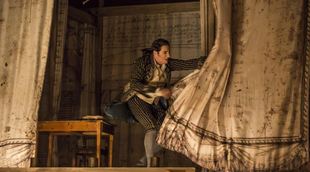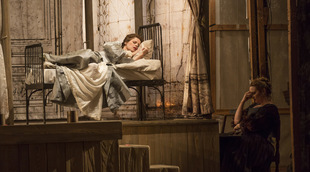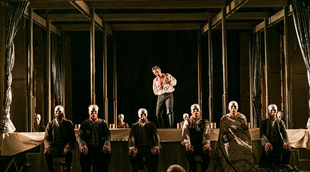 © DR
© DR
The idea of creating a ‘trilogy’ with the three operas that Mozart composed with libretti by Lorenzo Da Ponte is fantastic. Le nozze di Figaro, Don Giovanni and Così fan tutte were composed one after the other, a few years apart. There are numerous musical connections between them and more than one underlying dramatic connection as well. Bringing together a kind of ‘Mozart Marathon’ – nine hours’ worth of opera – by presenting the three operas in three consecutive days is an extraordinary idea, yet a risky one.
Liceu decided to stage four complete cycles of this ‘trilogy’ throughout April – from the 7th to the 9th, 11th to the 13th, 19th to the 21st and 23rd to the 25th. The performances reviewed here were from the last cycle, which ended with an intense and warm applause from the audience to the musicians. However, not all cycles went as well. For example, the first cycle of performances received a significant telling-off from the audience, as reviewed by the press. The audience from the first cycle were probably right, and so were those from the last cycle. What happened in between is an imbroglio worthy of a Da Ponte libretto.

Le Nozze di Figaro ; © Mats Bäcker

Le Nozze di Figaro ; © Mats Bäcker
To begin with, this project was planned to arrive at Liceu after touring through Bordeaux and Versailles, but this was hindered by the pandemic. As a result, Barcelona ended up being the first testing ground for an idea that hadn’t matured enough. Liceu took too many risks: out of the 16 singers that took part in the performances, only 2 had sung at Liceu before. The rest – all quite young – who had prepared for singing in small venues had to face for the first time in their careers the huge theatre at Liceu, with capacity for 2300 people. Many of the voices turned out to be too small or inadequate. Some adapted very quickly to the theatre’s acoustic, but others couldn’t.
To complicate things further, Covid, other illnesses and the fatigue of some of the singers provoked a wave of replacements. For example, there was the case of soprano Iulia Maria Dan who sang the Countess on Saturday at Le nozze, Donna Anna on Sunday at Don Giovanni and Fiordiligi on Monday at Così. Exhausting.
The musical direction of the project was entrusted to Marc Minkowski, a specialist in this kind of repertoire. The celebrated Parisian conductor ended up achieving a great sound from the orchestra in the last performances; the woodwinds were sweet and the sound was balanced, but this result was only achieved gradually.
Minkowski demanded great tempi contrasts from singers and instrumentalists, cuddling the voices in the most expressive passages yet imposing vertiginous tempi during the ensemble numbers, particularly those with a buffo character, where the togetherness between orchestra and voices didn’t hold particularly well. Within the instrumental section, it is worth highlighting the magnificent recitatives accompanied at the keyboard by Maria Shabashova.
Amongst the singers taking part in the final performances there was a bit of everything. Whilst there were no extraordinary individual performances, some were adequate, even good, and others were disappointing.
The above-mentioned Iulia Maria Dan offered a Countess that was only sufficient, including a rather uninteresting Dove sono. She was better the following day as Donna Anna and her Non mi dir was satisfactory. The soprano improved even more as Fiordiligi, where the score was more appropriate for her vocal characteristics, and she delivered a good performance.
Arianna Venditelli offered a perfectly adequate Susanna and Donna Elvira on the following day. Alix Le Saux, who was disappointing as Marcellina, did much better as Zerlina and Angela Brower, who was due to be replaced by Arianna Venditelli as Dorabella, eventually recovered being able to re-join the cast at the last minute and offered a good performance.
Lea Desandre, with a small yet beautiful voice, presented a vocally sufficient and scenically agile and enjoyable Cherubino. Miriam Albano, who perhaps overused caricature, being too commedia dell’arte, sang discreetly the role of Despina. Mercedes Gancedo, who was experienced, having sung at Liceu often, offered a Barbarina of great level.
Amongst the men, Alexandre Duhamel delivered both of his characters with vocal sufficiency, but was more convincing as Don Alfonso than as Don Giovanni. Robert Gleadow fell short on the high demands of the role of Figaro and was a little better as Leporello, although he didn’t manage to give to his very important character the vocal weight that it could have had.

Don Giovanni ; © Mats Bäcker
Thomas Dolié didn’t shine either in the demanding character of the Count. Alex Rosen, who in Don Giovanni took the characters of Masetto and Commendatore offered a satisfactory performance. Julien Henric, as Don Ottavio, generally delivered sufficiently his vocal part, although Il mio Tesoro was well below the expectations. The tenor didn’t sing Dalla sua pace as Don Giovanni was performed in the original Prague version which doesn’t include this aria. James Ley, who interestingly showed a much more beautiful voice during the sung numbers than in the recitatives, offered a good Ferrando and Florian Sempey also appeared convincing as Guglielmo.
In Le nozze, were absolutely disappointing both Norman Patzke in the double character of Bartolo and Antonio and Paco Garcia as Basilio and Don Curzio.
The trilogy was presented in a production by the Drottningholms Slottsteater, with stage direction by Ivan Alexandre and scenography and costumes by Antoine Fontaine. Alexandre’s idea plays with the ‘theatre within theatre’ resource and puts a simple structure in the middle of the stage simulating a small candlelit travelling theatre from the times of Mozart. The characters are constantly on stage entering and leaving the small theatre, dressing up and putting make up on before the audience. Often the action overflew the boundaries of the small theatre and expanded outside of it.
Visually, the ensemble wasn’t very attractive as it was thought for the small stage of the famous Swedish theatre, one of the few surviving theatres from the 18th century. When transposing this production at Liceu it needed to be closed off on the sides and on the top, which looked scrawny. The staging works well in Le nozze, not as much in the dramatism of Don Giovanni. It could work well in Così, but when one has been looking at the same set for nine hours, a scenography that already wasn’t particularly attractive becomes boring.
The stage direction by Alexandre recuperates the idea exposed by Kierkegaard according to which Cherubino would be a young Don Giovanni and Don Alfonso a decrepit one. This idea connects the three operas and this link is musically reinforced. As well as Mozart’s famous own quote from Le nozze’s Non più andrai in the last act from Don Giovanni, these performances added other musical links by incorporating melodies extracted from the other operas in some of the recitatives. A small, totally permissible musicological licence.
The Da Ponte trilogy is a great idea which, by the time it reaches Bordeaux or Versailles, should have been better prepared and adjusted.
Xavier Pujol
Barcelona, 23rd 24th and 25th April
Le nozze di Figaro. Thomas Dolié, baritone. Iulia Maria Dan, soprano. Arianna Vendittelli, soprano. Robert Gleadow, bass-baritone. Lea Desandre, mezzosoprano. Alix Le Saux, mezzosoprano. Norman Patzke, bass-baritone. Paco Garcia, tenor. Mercedes Gancedo, soprano.
Don Giovanni. Alexandre Duhamel, baritone. Alex Rosen, bass. Iulia Maria Dan, soprano.Julien Henric, tenor. Arianna Vendittelli, soprano. Robert Gleadow, bass-baritone. Alix Le Saux, mezzosoprano.
Così fan tutte. Iulia Maria Dan, soprano. Angela Brower, soprano. James Ley, tenor. Florian Sempey, baritone. Miriam Albano, mezzosoprano. Alexandre Duhamel, baritone.
Orchestra and Choir of Gran Teatre del Liceu. Conductor, Marc Minkowski. Stage director, Ivan Alexandre. Scenography and costumes, Antoine Fontaine. Production Drottningholms Slottsteater. Gran Teatre del Liceu.
the 28 of April, 2022 | Print
Comments